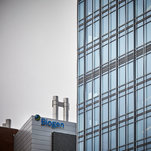
Peter Bergethon, the head of digital and quantitative medicine at Biogen, went home to his wife, an infectious-disease doctor.
A Biogen vice president in the Alzheimer’s franchise and her husband attended
They celebrated a holiday in the Greek Orthodox calendar, the end of the Carnival season, with special sweets and traditional dances that involved holding hands in a circle. Although celebrations in Greece had been canceled, the party in New Jersey went forward, since White House officials had just pronounced the virus in the United States to be under control.
That night, Allana Taranto, a photographer who covered the leadership meeting for Biogen, celebrated her 42nd birthday with her boyfriend and another couple.
Over that weekend, though, some people in the company had already started feeling sick.
Jie Li, a 37-year-old biostatistician who worked on the Alzheimer’s drug team, had chills, a cough and aches. She was too junior to attend the company’s leadership conference, but her boss went, and showed up at the office afterward.
On March 2, the following Monday, the company’s chief medical officer sent an email informing everyone who attended the leadership meeting that some people had fallen ill and telling them to contact a health care provider if they felt sick.
“We moved quickly,” Mr. Caouette said.
Still, that same day, the company’s four top executives attended a huge health care conference hosted by the investment firm Cowen. At another Marriott in Boston, they held meetings in hotel rooms with potential investors. Another attendee who met some of the same investors said he heard that members of the Biogen team looked sick.